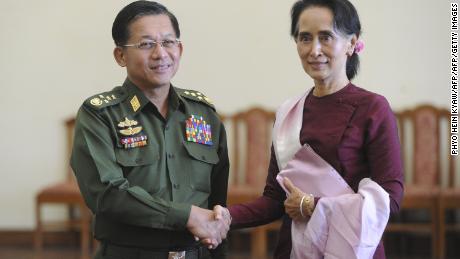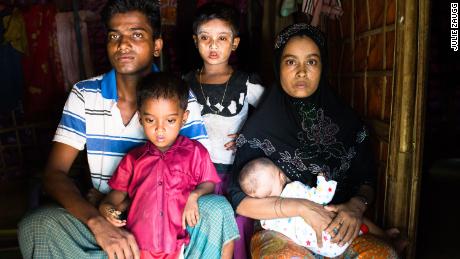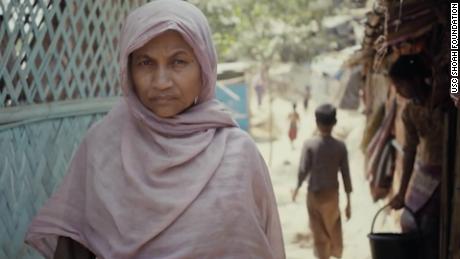UN accuses Myanmar military leaders of committing genocide

The damning report contains allegations of murder, imprisonment and sexual violence against the Rohingyas, carried out by the Myanmar military, known as the Tatmadaw, under the guise of a crackdown on terrorists, and against a backdrop of impunity that effectively placed military leaders above the law."Military necessity would never justify killing indiscriminately, gang raping women, assaulting children, and burning entire villages. The Tatmadaw's tactics are consistently and grossly disproportionate to actual security threats, especially in Rakhine State, but also in northern Myanmar," the report said.The report recommends the case be referred to the International Criminal Court in the Hague, or for an ad hoc tribunal to be created to investigate the actions of the alleged perpetrators. Six military leaders are named in the report, including Commander-in-Chief Senior General Min Aung Hlaing.Referring to the unusual step of naming the alleged perpetrators in the report, mission member Radhika Coomaraswamy told the media in Geneva on Monday morning that they had found "such overwhelming evidence" of wrongdoing and that the command had "such effective control from what we could gather that we could name … who was responsible." The names of others thought to culpable have been "put in an envelope" and will be given to the Human Rights Commissioner, Zeid Ra'ad Al Hussein, she said. "There are people we're very sure should be investigated."  UN investigators found that the Myanmar's civilian government had "contributed to the commission of atrocity crimes" through their "acts and omissions.""The State Counsellor, Daw Aung San Suu Kyi, has not used her de facto position as Head of Government, nor her moral authority, to stem or prevent the unfolding events in Rakhine State," the report states.Members of the misson said that the international community's involvement in the process is important, and that the country could not be expected to hold its military to account.Given "abusive military conduct going back half a century," and the "complete impunity of military commanders (and the) almost complete immunity given to troops," expecting justice from domestic processes was "simply naive," Christopher Sidoti, a member of the mission, said at a news conference.A number of humanitarian organizations, including Amnesty International and Save the Children, backed the UN's recommendation that Myanmar be referred to the International Criminal Court."The international community needs to send a firm signal to all perpetrators, including the Myanmar military, that crimes of this magnitude will not be allowed to pass unaccounted for," said Michael McGrath, country director in Myanmar for Save the Children.
UN investigators found that the Myanmar's civilian government had "contributed to the commission of atrocity crimes" through their "acts and omissions.""The State Counsellor, Daw Aung San Suu Kyi, has not used her de facto position as Head of Government, nor her moral authority, to stem or prevent the unfolding events in Rakhine State," the report states.Members of the misson said that the international community's involvement in the process is important, and that the country could not be expected to hold its military to account.Given "abusive military conduct going back half a century," and the "complete impunity of military commanders (and the) almost complete immunity given to troops," expecting justice from domestic processes was "simply naive," Christopher Sidoti, a member of the mission, said at a news conference.A number of humanitarian organizations, including Amnesty International and Save the Children, backed the UN's recommendation that Myanmar be referred to the International Criminal Court."The international community needs to send a firm signal to all perpetrators, including the Myanmar military, that crimes of this magnitude will not be allowed to pass unaccounted for," said Michael McGrath, country director in Myanmar for Save the Children.
Mass exodus
Last August, hundreds of thousands of Rohingya Muslims started fleeing across the border into Bangladesh into what's since become the world's biggest refugee camp. Many of those who crossed the border have recounted horrific stories of being driven from their homes under threat of death.  Myanmar's military has repeatedly denied that it has deliberately attacked unarmed Rohingya. Instead, the authorities insist that it only targets Rohingya militants, mostly from the Arakan Rohingya Salvation Army (ARSA) insurgent group, which has launched deadly attacks on police posts."There is no evidence that Myanmar soldiers committed any human rights violations in their response to the ARSA terrorist attacks of 2017. We have recently formed a new independent commission, which will investigate alleged rights abuses in Rakhine State including rape. We will treat any case in accordance with the rule of law," Zaw Htay, a spokesman for Myanmar's presidential office told CNN earlier in August. Despite being barred access to the affected regions, investigators conducted 875 interviews with victims and eyewitnesses, and examined satellite images and forensic and other documentary evidence. Mission chairman Marzuki Darusman said it believes "there is hope for Myanmar," and that the investigation was undertaken as the "first stepping stone for change."Without the truth, Myanmar will not be able to ensure a stable and prosperous future for its people," he said, adding that its "transition into a democratic state has barely begun."Myanmar fires general in charge of Rohingya crackdown after EU sanctions
Myanmar's military has repeatedly denied that it has deliberately attacked unarmed Rohingya. Instead, the authorities insist that it only targets Rohingya militants, mostly from the Arakan Rohingya Salvation Army (ARSA) insurgent group, which has launched deadly attacks on police posts."There is no evidence that Myanmar soldiers committed any human rights violations in their response to the ARSA terrorist attacks of 2017. We have recently formed a new independent commission, which will investigate alleged rights abuses in Rakhine State including rape. We will treat any case in accordance with the rule of law," Zaw Htay, a spokesman for Myanmar's presidential office told CNN earlier in August. Despite being barred access to the affected regions, investigators conducted 875 interviews with victims and eyewitnesses, and examined satellite images and forensic and other documentary evidence. Mission chairman Marzuki Darusman said it believes "there is hope for Myanmar," and that the investigation was undertaken as the "first stepping stone for change."Without the truth, Myanmar will not be able to ensure a stable and prosperous future for its people," he said, adding that its "transition into a democratic state has barely begun."Myanmar fires general in charge of Rohingya crackdown after EU sanctions
Systematic campaign
The report by the UN Independent International Fact-Finding Mission on Myanmar concludes that human rights violations in Kachin, Shan and Rakhine states "undoubtedly amount to the gravest crimes under international law."In the past, the United Nations has called the alleged campaign of violence, including mass killings, rape and the burning of Rohingya villages by Myanmar government forces a "textbook example of ethnic cleansing," while UN Special Rapporteur Yanghee Lee has said that the attacks bear the "hallmarks of genocide."The report says the actions of the military compare to previous examples of genocide."The crimes in Rakhine State, and the manner in which they were perpetrated, are similar in nature, gravity and scope to those that have allowed genocidal intent to be established in other contexts," it says, including "policies… to alter the demographic composition of Rakhine State; the level of organization indicating a plan for destruction; and the extreme scale and brutality of the violence.""Like almost all circumstances of genocide, there is no smoking gun," said Sidoti at Monday's press conference, adding that there was "no doubt in our minds whatsoever that what we saw happen in Rakhine" would not have happened without the knowledge and control of the country's highest military figures.The report also highlighted the role of hate speech spread on social media platforms, including Facebook, in the violence perpetrated in Myanmar. In response to the report, Facebook announced Monday that it is banning 20 individuals and organizations from the platform, including Senior General Min Aung Hlaing, and removing more than 50 Facebook pages, most of which were allegedly "covertly push(ing) the messages of the Myanmar military."
What happens next?
The crime of genocide has never been tried at the International Criminal Court, which was established in 2002 as the world's first permanent war crimes court. Complicating matters further is that Myanmar is not a member state of the court and the ICC therefore does not have automatic jurisdiction there. Perpetrators of genocides in the former Yugoslavia and in Rwanda have been convicted through ad hoc tribunals — the second option suggested in the UN report — but these have often taken many years to conclude.Either recommendation in Monday's report is likely to result in a years-long process, with no guarantee of a conviction. But with the events being officially described as genocide for the first time, dozens of countries are now legally compelled to take action. All states that have ratified the 1948 Convention on the Prevention and Punishment of the Crime of Genocide pledged to "undertake to prevent and punish" genocide when they signed.Those states include the UK, Canada, Australia and the US.
Perpetrators of genocides in the former Yugoslavia and in Rwanda have been convicted through ad hoc tribunals — the second option suggested in the UN report — but these have often taken many years to conclude.Either recommendation in Monday's report is likely to result in a years-long process, with no guarantee of a conviction. But with the events being officially described as genocide for the first time, dozens of countries are now legally compelled to take action. All states that have ratified the 1948 Convention on the Prevention and Punishment of the Crime of Genocide pledged to "undertake to prevent and punish" genocide when they signed.Those states include the UK, Canada, Australia and the US.
'Terrorist activities'
Once seen as a defender of human rights, Myanmar state counsellor Suu Kyi has been heavily criticized for her failure to act as the scale of the attacks against the Rohingya emerged.Speaking on August 21 following a lecture in Singapore, Suu Kyi again reiterated the government's claim that "terrorist activities" remain a threat in Rakhine state that has to be addressed."The danger of terrorist activities, which was the initial cause of events leading to the humanitarian crisis in Rakhine, remains real and present today. Unless this security challenge is addressed, the risk of inter-communal violence will remain," she said.The refugees languishing in camps in Bangladesh are set to be sent home under a repatriation agreement made between Myanmar and Bangladesh. However, the timing of their return is uncertain.Suu Kyi said last week that it was "very difficult" to put a time frame on the return of tens of thousands of Rohingyas, because the country has to work with Bangladesh to make it happen. Mission chairman Darusman said Monday that the Myanmar government had not cooperated with the investigation or responded to the report, in its draft or published form.More details of the UN's investigation and recommendations will emerge next month, when a fuller, 400-page report will be published.
Original Article
[contf] [contfnew] 
CNN
[contfnewc] [contfnewc]



